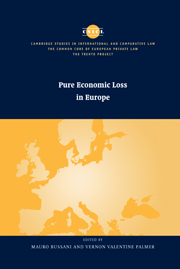Book contents
- Frontmatter
- Contents
- General editors' preface
- Preface
- List of contributors
- Table of legislation
- Relevant statutory and codified provisions (in translation)
- List of abbreviations
- Part I Situating the Frontier
- Part II The comparative evidence: case responses and editors' comparative comments
- Part III Much ado about something
- 8 Summary and survey of the cases and results
- 9 General conclusions of the study
- 10 The recoverability of pure economic loss within the perspective of a European codification
- Bibliography
- Index
8 - Summary and survey of the cases and results
Published online by Cambridge University Press: 03 November 2009
- Frontmatter
- Contents
- General editors' preface
- Preface
- List of contributors
- Table of legislation
- Relevant statutory and codified provisions (in translation)
- List of abbreviations
- Part I Situating the Frontier
- Part II The comparative evidence: case responses and editors' comparative comments
- Part III Much ado about something
- 8 Summary and survey of the cases and results
- 9 General conclusions of the study
- 10 The recoverability of pure economic loss within the perspective of a European codification
- Bibliography
- Index
Summary
Introduction
Our task is now to summarize and compare the results contained in the national reports. In order to give the reader a helpful overview, we have arranged the results in a series of tables, and at the end of the section we discuss a number of findings and make comparative comments based upon them. Table 8.1 organizes the answers country-by-country, and we have continued to use the liberal, pragmatic and conservative regimes as our ordering principle. Table 8.2 compares two theories of relief, delictual and contractual, and shows the extent to which European systems make recourse to contractual ideas as an alternative to tort. Here the table shows the degree to which they rely on these two grounds instead of the single ground of tort. Table 8.3 breaks down the results for a number of widely-recognized paradigm cases (fitted to our taxonomy), and once again the results are organized in terms of the liberal, pragmatic and conservative regimes.
In compiling these results, we consciously followed a conservative way of interpreting the results. We placed the responses into one of three categories: Yes, No, and Problematical. A ‘yes’ means that compensation for pure economic loss would be granted. (We also distinguished, however, between an affirmative grant of recovery in delict and recovery in contract or on some other basis). An answer was not considered a clear-cut yes or no, however, unless the national reporter expressed the probable outcome with clarity and confidence. If for any reason the reporter's answer indicated doubt or difficulty in predicting the outcome, the case was classified as ‘problematical’.
- Type
- Chapter
- Information
- Pure Economic Loss in Europe , pp. 523 - 529Publisher: Cambridge University PressPrint publication year: 2003

